It seems like the Premier League has a humdinger of a season on its hands. Just shy of a quarter of the way into the campaign, five of the league’s traditional big six are within two points of first place. The only presumptive powerhouse not seemingly in the title race is Manchester United, currently five points behind the top five. The three teams tied atop the table, Chelsea, Liverpool, and Manchester City, all have 20 points and have yet to lose a game, while the clubs from North London, Tottenham Hotspur and Arsenal, both sit two points back with 18 points. The table tells the story of an exciting, wide-open, competitive Premier League.
Well, the table is a liar.
Look a little deeper and it turns out that while these five teams might have similar point totals, they are not, in fact, similar in ability. Rather than portend an exciting season, the top of the table is a quirk of the opening two months, an artifact that will likely fade away as the games pile up and the cream rises. Here’s how each team came to be at the top of the Premier League table, who is set to fade away, and who might manage to stay in it for the long haul.
Arsenal: Just Lucky to Be Here
After a scary opening two games, losing to both Manchester City and Chelsea, Arsenal have reeled off six straight wins. That’s a great way for new manager Unai Emery to buy himself some goodwill with decision-makers at the club and earn time to bring his new system to a team that before this season had spent multiple generations under Arsène Wenger. Arsenal were in desperate need of some good times after the several seasons of constant negativity surrounding the slow-building divorce between the club and its ever-present manager. Now, the results this season have been great, and Arsenal fans should enjoy them … because they’re unlikely to continue. While Arsenal’s results have been good, their performances have not been, and unless something changes, and fast, the winning is unlikely to continue.
Arsenal’s major problems are on the defensive side of the ball. They’ve conceded 10 goals, which isn’t great (although, given that half of them were against Chelsea and City, two of the best attacking teams in the world, it’s somewhat understandable), but that doesn’t tell the whole story. They’ve actually run fairly hot defensively, as they’ve conceded close to 12 expected goals.
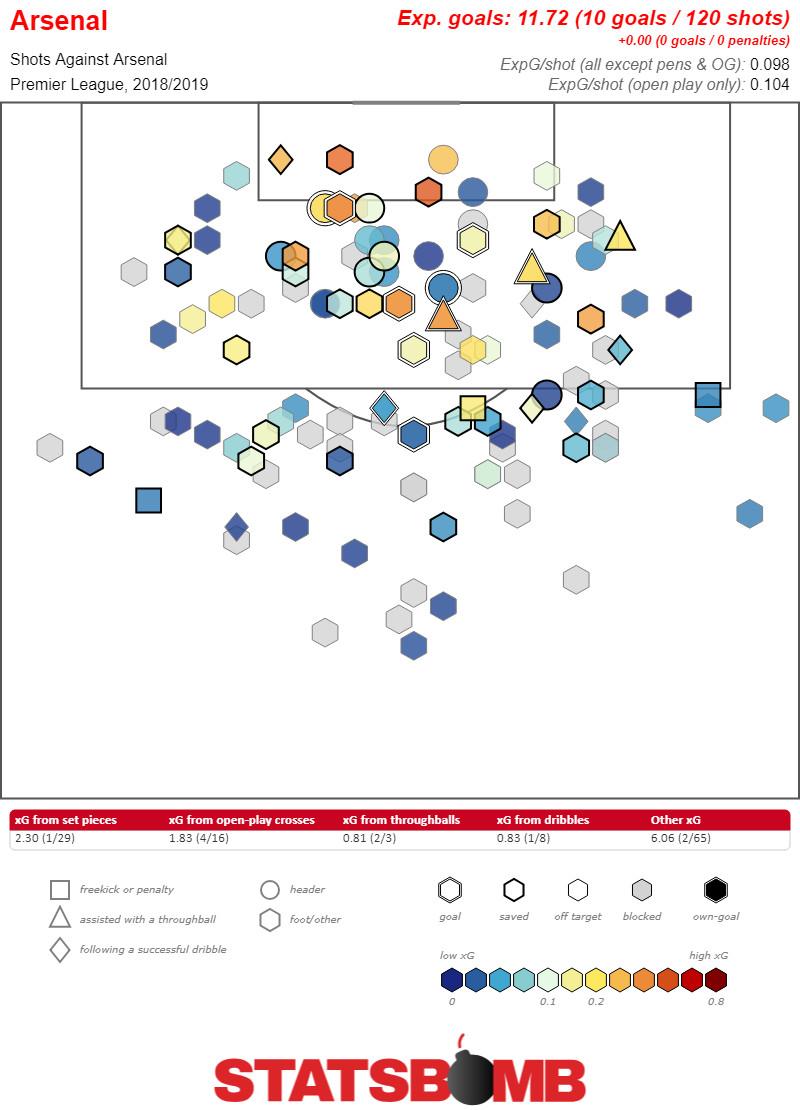
That works out to 1.47 expected goals conceded per game—the fifth-worst total in the league. That’s not just bad for a title-contending team; it’s bad for any team, anywhere. Again, Arsenal’s first two matches — a 2-0 loss at home against Manchester City in which they conceded 2.13 expected goals and a 3-2 loss away to Chelsea in which they conceded 2.38 expected goals — still haunt their numbers. So as the level of competition continues to even out, perhaps those numbers will tick up slightly.
But even if there’s some natural improvement, Arsenal sure don’t look like a good defensive team. And if they want to hang at the top of the table, their attack had better be great. So far, it isn’t. They average 1.44 expected goals per match, a respectable number, the fifth best in the Premier League (behind the other four teams in the top five of the table), but not the kind of number that will counteract a defense that is constantly being split open, even by unimpressive attacking sides like Watford and Cardiff. They take only 12.5 shots per game, 10th most in the league, which keeps them from generating enough scoring chances, even though they’re taking very good shots. With Pierre-Emerick Aubameyang and Alexandre Lacazette finishing moves, Granit Xhaka starting them, and Mesut Özil knitting them together, Arsenal’s attack is competent. It’s just that “competent” isn’t enough, given their porous defense.
The bottom line for Arsenal is that if their defense doesn’t improve and unless their attack becomes historically great, there is no way they’ll hang anywhere close to the top of the table for long.
Tottenham Hotspur: Quietly Struggling
In recent years, Spurs’ calling card has been their defense. Mauricio Pochettino came to the club before the 2014-15 season and brought with him a hard-nosed, aggressive press, which didn’t so much beat teams as grind them slowly into submission. That’s gone this year. Tottenham’s defensive numbers are OK. In past seasons they were near the top of the league in suppressing shots, and consequently expected goals; this year they’re merely above average. They concede 1.05 expected goals per match, the seventh-best total in the league. But more notably, they’re conceding 11.75 shots per match, more than seven other teams. To the extent their defense works, it’s not because it suppresses shots, but rather because it defends them well.
There’s been a marked decrease in how and where Spurs apply pressure on the field. Looking at a heat map of where Spurs apply pressure compared to league average (redder meaning more than league average, and bluer means less) shows a team that got after opponents high up the field last year, pressuring them all over the place.
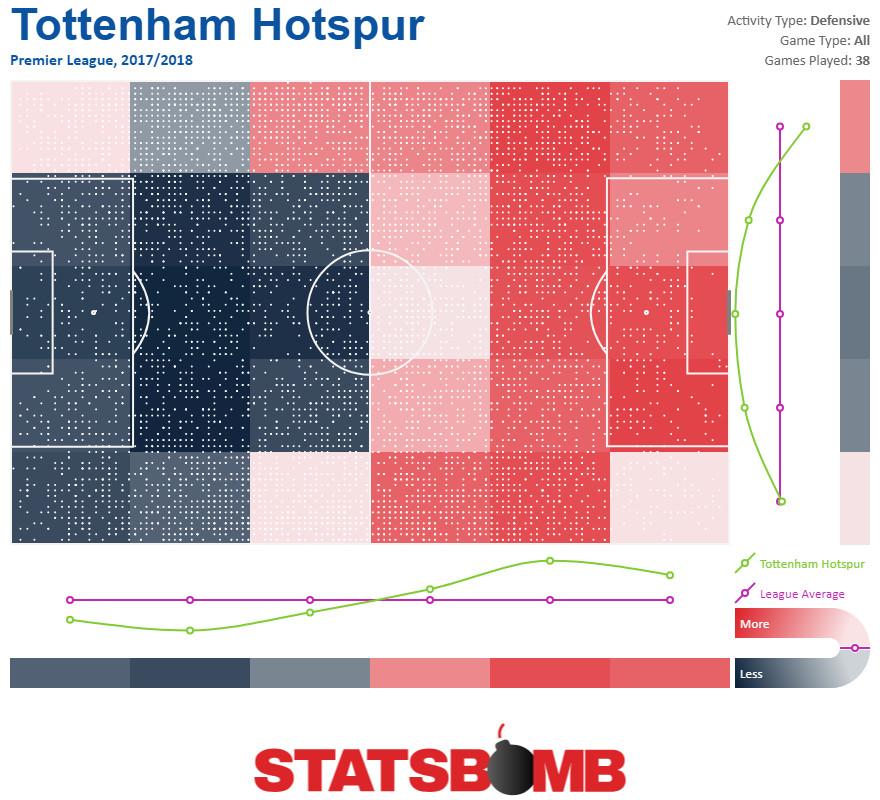
This year? Not so much.
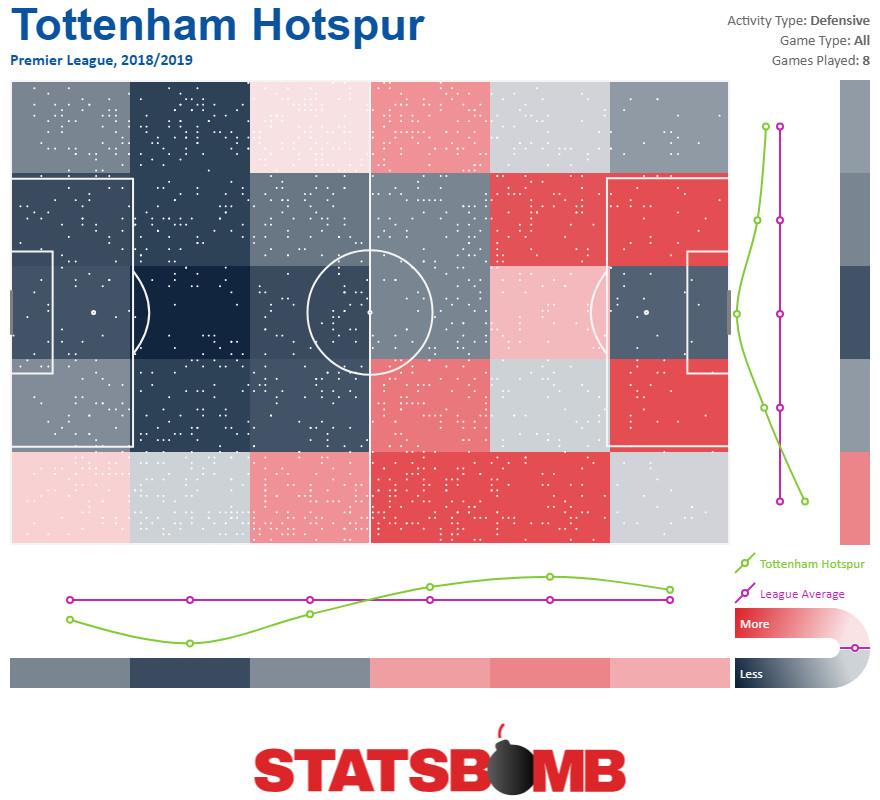
Spurs’ defense has eroded. It’s not terrible, but it sure ain’t what it used to be.
Much like Arsenal, Spurs’ attack isn’t good enough to overcome a mediocre defense. Harry Kane has yet to hit the heights of last year, and instead the bulk of Spurs shots are distributed more equally across their entire attacking corps. In fact, among Spurs players with 300 or more minutes logged, it’s Dele Alli leading the way, with 0.48 expected goals per 90 minutes, and then Kane a spot behind him.
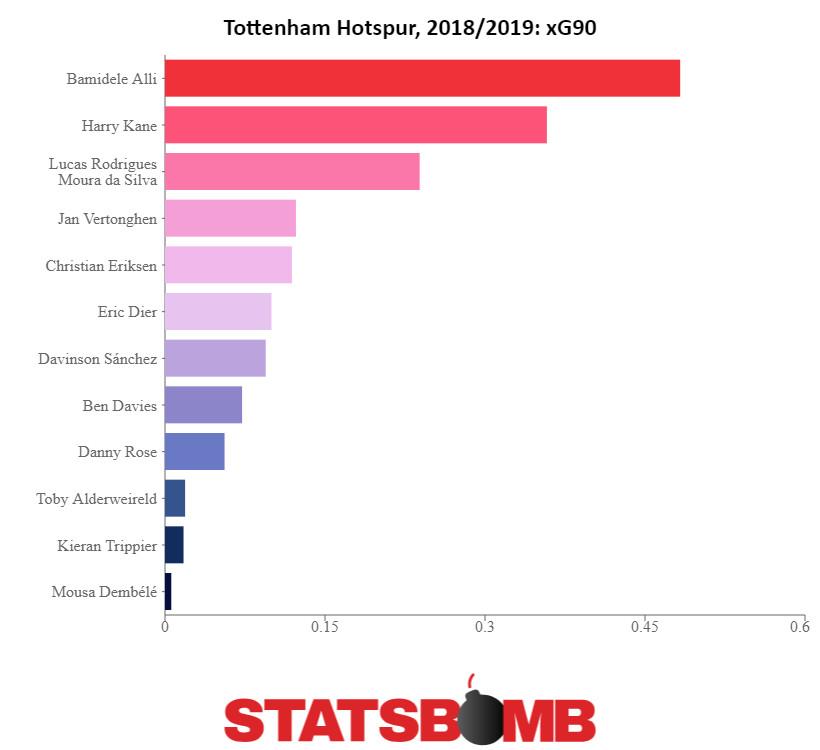
Put it all together and Spurs are a competent defensive side and a pretty good attacking one. That’s the kind of team that might compete for the top four, but one that’s unlikely to hang near the top of the table without improving.
Chelsea: The Surprising Contender
Chelsea’s possession play has been a revelation under manager Maurizio Sarri. Led by Jorginho at the base of a three-man midfield, the team relentlessly moves the ball into the final third, pinning teams ever deeper into their own halves. Chelsea play 745 passes per game, the most of any team in the Premier League. They aren’t quite a finely tuned machine, though, and their possession game isn’t creating high-quality chances. Instead, it’s leading to Chelsea burying teams in an avalanche of mediocre shots. They take 17.50 shots per match, the second most in the league, and score 1.79 expected goals per match, the third most. Five teams take more valuable shots on average than Chelsea’s 0.10 expected goals per shot, though. Eden Hazard might have become a scoring machine this year, but he isn’t creating that many more chances than he used to. If Hazard is going to keep up his newfound scoring ways, he’ll need to either start shooting more, start taking shots that have a higher likelihood of becoming goals, or both.
Meanwhile, on the defensive side of the ball there’s at least some reason for concern. Unsurprisingly, since Chelsea always have the ball, teams manage to take relatively few shots against them (9.65, the fourth fewest in the league), but those shots are relatively high value. Chelsea’s expected goals conceded of 0.99 per match is only the sixth best in the league. Now, that’s not a huge concern given their robust attack, and their expected goal difference is no. 3 in the Premier League, which seems to put them right about where they should be: in the hunt near the top of the table, but unlikely to keep pace with the other best teams over the long haul. The fact that they can neither consistently create high-quality chances nor stop other teams from counterattacking probably keeps them from being at the elite level of the two teams they’re chasing. With a little more precision, Chelsea might become great, but they aren’t there yet.
Liverpool: The Best Hope for a Title Race
Despite some recent struggles, Liverpool are great. How else would a team that drew against Chelsea at Stamford Bridge and then at home against City (sandwiched around a disappointing Champions League loss away to Napoli) be described as having “struggles”? Their attack is the opposite of Chelsea’s. They take the third-most shots in the league, 14.75 per game, but have the second-highest expected goal total of 1.92 because they are absolute monsters at getting great shots. They pressure teams mercilessly, turn them over, and then spring forward to convert those turnovers into great scoring chances against unsettled defenses. Good luck trying to play out of the back against this wall of red.
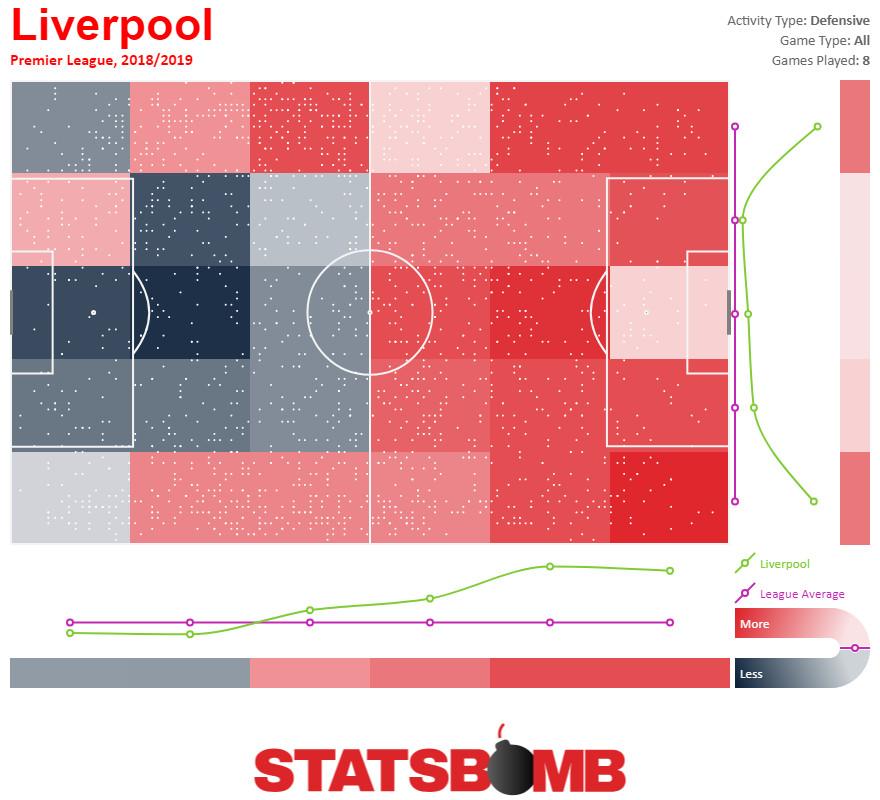
Liverpool’s defense is fantastic. Over the last calendar year the team has developed from an aggressive defense that was occasionally exposed at the back to one that balances taking the ball away with consistently solid rearguard action, thanks to the addition of Virgil van Dijk and the development of Joe Gomez. And on top of being great, Liverpool’s defense has been lucky too. They’re the second-stingiest defense in the Premier League, with 0.86 expected goals per match conceded, on only 8.13 shots. But they’ve outrun those numbers and conceded only three.
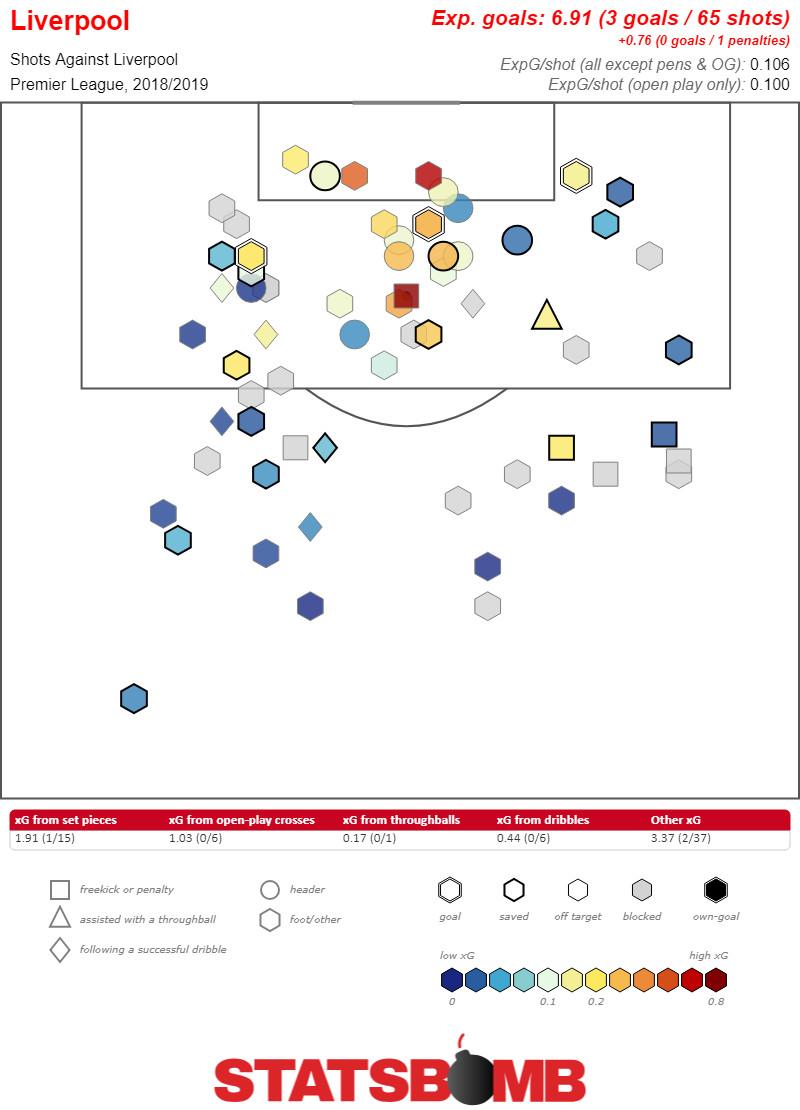
If there’s one fly in the ointment for Liverpool it’s that they’ve run a little bit cold in attack. Those expected-goals numbers are very good, but 15 goals scored is a more mediocre haul—four teams, including Bournemouth, have scored more than that. In particular, Mohamed Salah, after his lava-hot season last year, has “only” three goals through eight games into this season. The good news is there’s absolutely no reason to worry about Salah. If anything, his underlying numbers this year are actually slightly better than last season.
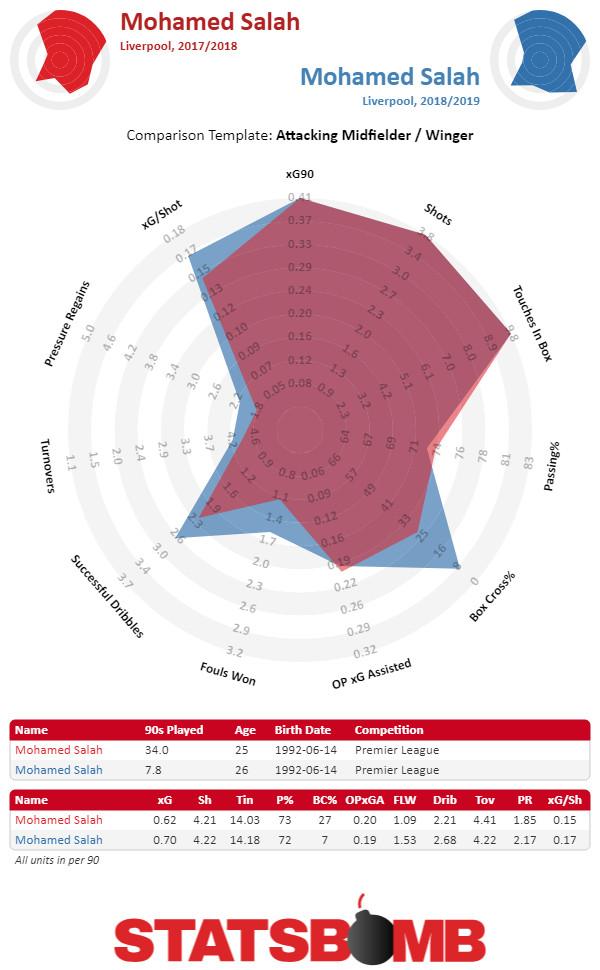
Salah continues to be great, and his numbers will eventually reflect that. He isn’t a problem for Liverpool. In fact, pretty much everything under manager Jürgen Klopp’s control isn’t a problem for Liverpool. The team really only has one problem, and that’s Manchester City.
Manchester City: The Presumptive Champions
It’s not hard to describe just how good Manchester City are. They’re the only team in the Premier League to take over 18 shots per game. They take 22.38. They’re the only team to average over two expected goals per match. They average 2.80. Defensively, they’re the only team to concede fewer than eight shots per game. They concede 6.67. They’re the only team to concede fewer than 0.80 expected goals per match. They concede 0.54. You get the idea.
Manchester City are the best team in the league, and it’s not particularly close. Teams literally cannot get out of their own penalty box against City’s counterpress.
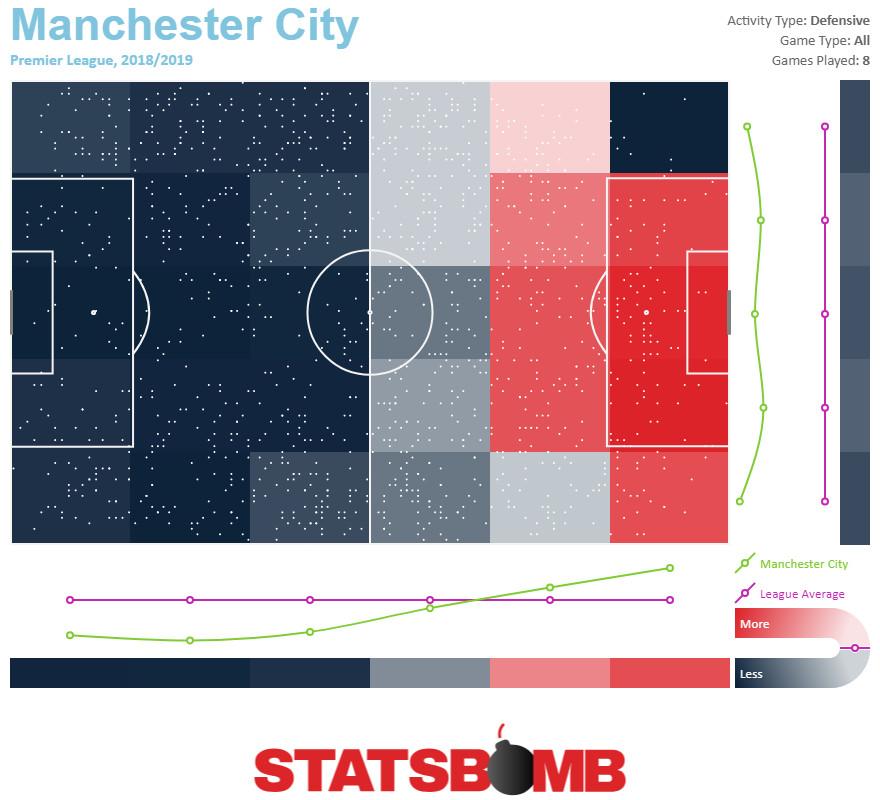
hat’s just plain unfair. It’s putting your outstretched hand into your younger brother’s forehead while he wildly flails his fists at you. It’s Game Genie. It’s the one kid who hit puberty two years early and grew 6 inches. Manchester City are just that much better than everybody else.
Usually, whatever team wins the Premier League has everything go right. Their attackers catch fire, their keeper fortuitously sprouts an extra arm, they overperform expected goals on one or both sides of the ball. A few bounces going a team’s way is all it takes for one great team to end up six points ahead of another one. The last time somebody not named Guardiola won the league, it was an Antonio Conte–led Chelsea side. That team was a great defensive side; their expected goals conceded led the league with just under 29, and a mediocre attacking squad with just under 62 expected goals scored. But they got hot in the middle of the year, running off 13 wins in a row and finishing the year with 85 goals, and that was all it took to finish seven points ahead of Spurs.
But this year City’s performances are so far ahead of everybody else that they probably won’t need those bounces. If everything goes exactly right for a team like Chelsea or Liverpool, and City get a little bit unlucky, then Guardiola will still likely be lifting the trophy at the end of the year. It will take perfect seasons from Chelsea or Liverpool (seasons that Spurs and Arsenal almost certainly aren’t capable of) just to give them a chance to be close enough to hope that City then get really unlucky.
Can that happen? Sure, lots of things can happen. Leicester can win the title; Barcelona, Real Madrid, and Bayern Munich can all collapse at the same time; it can rain frogs. The question of will it happen, though, is another thing altogether. The world where City doesn’t win the Premier League title is getting harder and harder to imagine. It’s starting to involve things like historic levels of injuries (or at least an injury to Fernandinho, City’s central midfield lynchpin, who despite being 33 years old and playing an incredibly demanding role remains an iron man), or Ederson being hypnotized into believing he’s Claudio Bravo, or Pep Guardiola suddenly announcing he has become bored with us mere mortals and is choosing to leave for a monastery to seek enlightenment.
In a normal season, the top of the table right now would have a great team in Liverpool, a very good team in Chelsea, a team with an outside chance of hanging in there in Spurs, and an interloper in Arsenal. But this isn’t a normal year. This isn’t even last year. The 2017-18 version of Manchester City were a fantastic side that won a Premier League–record 100 points while winning the title by 19 points. This year, they’re playing better on both sides of the ball. Last year Manchester City beat everybody; this year they’re breaking them. The table might seem tight at the moment, but the reality is that Manchester City are in a league all by themselves.
All stats are courtesy of StatsBomb.